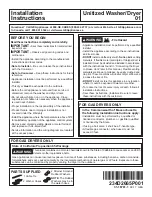
SOFT WATER (0-3 grains hardness)
MEDIUM WATER (3-7 grains)
HARD WATER (7-12 grains*)
CYCLES
Main Cup
Open Cup
Main Cup
Open Cup
Main Cup‡
Open Cup‡
POTSCRUBBER
Half Full
Half Full
Completely
Half Full
Completely
Completely
NORMAL WASH
Full
Full
Full
WATER SAVER
Half Full
None
Half Full
None
Completely
None
CHINA CRYSTAL
Full
SHORT WASH
RINSE & HOLD
Use no detergent
Use no detergent
Use no detergent
*12 grains and up is extremely hard water. A water softener is recommended. Without it, lime
‡Filled Main Cup holds 3 tablespoons;
can build up in the water valve. The water valve may stick while open and cause flooding.
filled Open Cup holds 2 tablespoons.
You’ll find two detergent dispensers on the inside
door of your dishwasher. Two, because
some cycles use two washes.
See ‘‘Detergent Usage Guide’’below.
(Be sure the CYCLE INDICATOR
DIAL is at OFF position before
adding detergent. Otherwise,
the detergent cup will not
close and latch properly.)
Close the main cup.
NOTE: To open detergent cup after it has
been closed, unlatch the door and rotate the
Cycle Indicator Dial a full turn to the OFF
position. When the closed cup contains
soap it is best that the door be in a partially
open position before rotating the Cycle
Indicator Dial. This will help reduce the amount of
detergent and rinse aid agent spillage into the tub.
Detergent Usage Guide
(powder or liquid)
+
+
+
Open
Cup
Main
Cup
Grasp handle,
rotate and
close tightly
Use only powder or liquid detergent specifically
made for use in dishwashers. Other types will cause
oversudsing.
How much detergent should you use? That depends.
Is your water ‘‘hard’’ or ‘‘soft’’? With hard water, you
need extra detergent to get dishes clean. With soft water,
you need less detergent.
Your water department can tell you how hard your
water is. So can your county extension agent or your
area’s water softener company. Just call and ask them
how many ‘‘grains’’ of hardness there are in your water.
Too much detergent with soft water not only wastes
money, it can be harmful. It can cause a permanent
cloudiness of glassware, called ‘‘etching.’’ An outside
layer of glass is etched away! Of course, this takes some
time. But why take a chance when it’s easy to find out the
hardness of your water.
Keep your detergent fresh and dry. Under the sink
isn’t a good place to store detergent because there is
too much moisture. Don’t put powder detergent into
the dispenser until you’re ready to wash dishes, either.
(It won’t be fresh OR dry.)
If your powder detergent gets old or lumpy, throw it
away. Old detergent often won’t dissolve. If you use a
liquid dishwasher detergent, these precautions are not
necessary because liquid detergents don’t ‘‘lump’’ as
they age or come in contact with moisture.
How to Choose and Use the Right Detergent
How to Prepare the Dishes for Washing
If this is your first dishwasher, or if you’re
replacing a much older model, you may wonder
how much preparation your dishes need. Actually
very little. Scrape off bones, seeds, skins, toothpicks
and other hard solids. Remove excessive quantities
of oil or grease.
NOTE: You may also want to consider removing
foods such as mustard, mayonnaise, vinegar, lemon
juice and other foods that can cause discoloration of
stainless steel if allowed to remain on dishes for a long
period of time.
The POTSCRUBBER cycle can wash heavily soiled
dishes and remove dried-on and baked-on soils from
pots, pans and casseroles. Items with burned-on
soils need extra preparation.
Detergent Dispensers
7
Hot W
ater
Rinse Agents
Detergents
Dish Pr
eparation
Содержание GSD1430
Страница 16: ...16 NOTES...
Страница 17: ...17 NOTES...






































